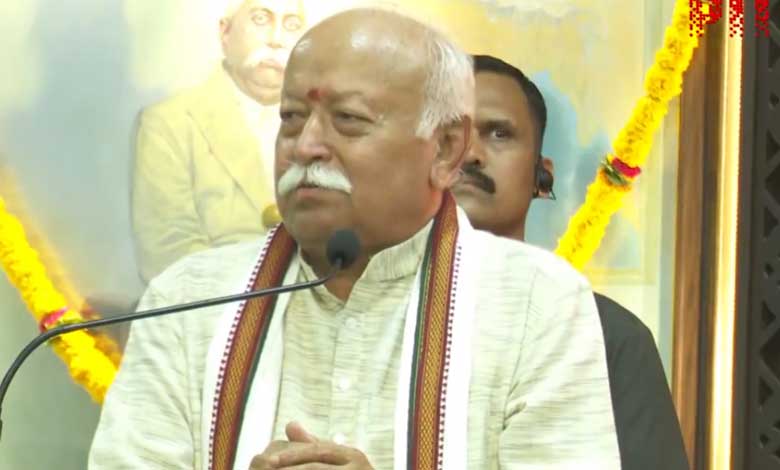RSS Chief Mohan Bhagwat Calls for End to Mandir-Masjid Debates, Urges Unity in Diversity
In a thought-provoking speech on Thursday, RSS Sarsanghchalak (chief) Mohan Bhagwat raised questions about India's identity and future, challenging political and cultural norms.

In a thought-provoking speech on Thursday, RSS Sarsanghchalak (chief) Mohan Bhagwat raised questions about India’s identity and future, challenging political and cultural norms. At the Sahajeevan Vyakhyanmala series in Pune, Bhagwat invoked an intriguing analogy: “If a crow sits on top of a temple, can it become an eagle?” The rhetorical question was aimed at those who, according to Bhagwat, believed that stirring up issues related to temples and mosques could make them Hindu leaders. The message was clear: such activism does not elevate the nation or its people but only serves to stir division.
In the same address, Bhagwat returned to a central theme of the Rashtriya Swayamsevak Sangh (RSS)—the vision of India as a “Vishwaguru” or teacher to the world. This ambition, he noted, has been sidelined in recent discourse, with External Affairs Minister S. Jaishankar recently promoting the idea of India as a “Vishwamitra” (friend to the world). Bhagwat’s comments come at a time when the BJP-led government and its supporters have distanced themselves from the rhetoric of India as a spiritual and moral leader on the world stage, focusing more on global partnerships than a dominant philosophical role.
However, Bhagwat’s call for a more harmonious approach to India’s identity is not limited to foreign policy. It also extends to domestic politics, especially in the context of ongoing communal tensions. He urged the country to remove the divisive “temple-mosque” rhetoric that has dominated much of the political discourse in recent years, especially in the Hindi heartland. Bhagwat referenced the growing claims of “masjids built over mandirs,” citing places like Sambhal and Ajmer Sharif as an example of the contentious issues that have sparked unrest.
He urged for a “small experiment” in which India could demonstrate peace by putting aside such contentious issues and living together in Unity. Bhagwat emphasized that India’s identity has always been shaped by its unique ancient ideology and “samveshi sanskriti” (inclusive culture), which celebrates diversity. He stated, “Unity doesn’t mean homogenizing or destroying this diversity. We must start believing that diversity is our Unity.”
In a significant departure from the hardline rhetoric that has sometimes characterized Hindu politics, Bhagwat also called out those who sought to rise as leaders by exploiting communal issues. “Some people think they can become Hindu leaders by raising such issues,” he said. “That’s like a crow sitting atop a temple hoping to become an eagle.” This remark signals a possible shift in the RSS’s strategy as it seeks to recalibrate its role in India’s political landscape, particularly as it grapples with rising communal tensions.
Also Read: Fact Check: Did Rahul Gandhi Admit to Pushing MPs During Parliament Protest?
Bhagwat’s remarks also referenced India’s history, drawing attention to the period of Muslim rule and the cultural assimilation that occurred before Aurangzeb’s reign disrupted it. He lamented how colonial rule, particularly after the 1857 uprising, deepened divisions between Hindus and Muslims, leading to the creation of Pakistan. “We can’t let somebody do similar mischief again,” Bhagwat warned, emphasizing the importance of Unity.
The RSS chief’s speech has prompted mixed reactions. While some view his comments as a timely reminder to avoid further communal escalation, others, particularly those on the hard Right, have criticized his stance. Many accused Bhagwat of losing touch with his base on social media, arguing that his call to stop focusing on temple-mosque issues undermines the long-awaited pursuit of justice for historical wrongs.
As the Supreme Court hears a challenge to the Places of Worship Act, 1991, which maintains the status quo of religious sites in India, Bhagwat’s call for a cessation of these divisive issues could signal a shift in the RSS’s approach. His statements raise the question of whether the Modi government will align with this position or continue to support the ongoing activism surrounding places of worship.
Bhagwat’s emphasis on Unity, while controversial in some quarters, also seeks to preserve the global image of Hinduism, which is often linked to extremist rhetoric. In his speech, he suggested that the RSS and BJP should maintain control over Hindu politics to prevent it from fragmenting into numerous more minor factions. “If we allow these issues to continue, the government will find it increasingly difficult to maintain peace and order,” he warned, acknowledging the risks of growing unrest.
As India faces a critical juncture in its political and cultural discourse, Bhagwat’s words offer a complex yet rational intervention. Whether this shift in strategy will resonate with the RSS’s vast support base and influence the BJP’s handling of communal tensions remains to be seen. The coming months will likely determine how seriously the sarsanghchalak’s call for Unity is taken within the party and the wider public.
